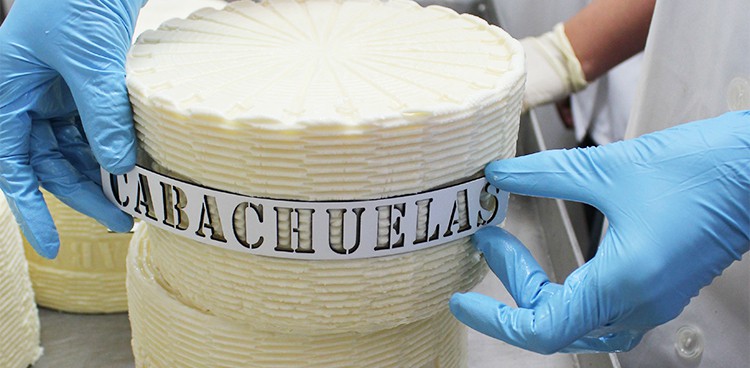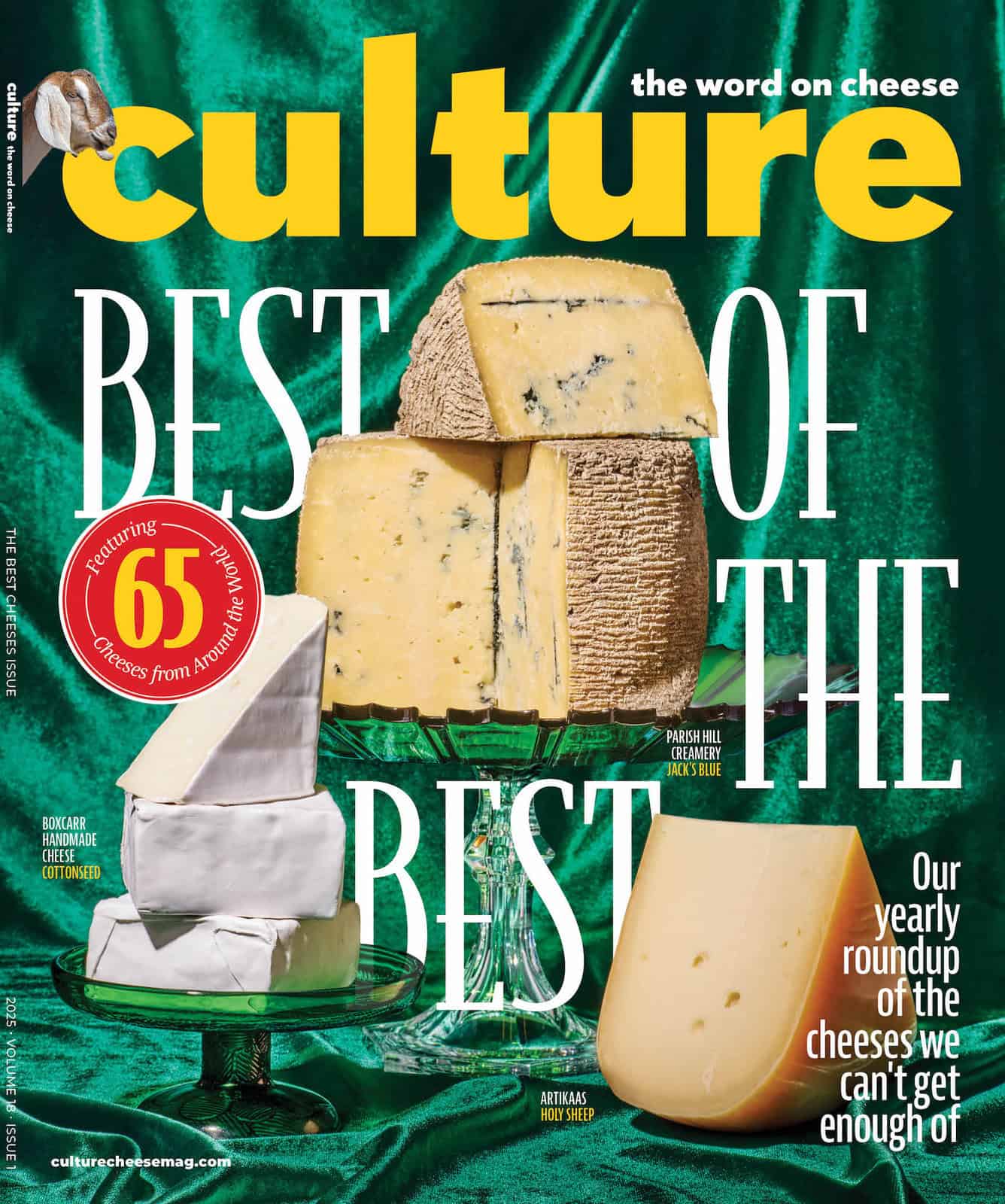
From Cabrales to Cotija, get ready to learn about Latin American cheese with Jamie Ditaranto. Starting with Spain and Portugal, across the Atlantic to the Caribbean, along the Gulf of Mexico, through the Amazon, and down the Andes, we’ll learn about the history, styles, flavors, and textures of Latin American cheeses in all their delectable glory. So, grab a cerveza and settle in for some mouth-watering reading on Cheeses of Latin America. Missed last week’s introduction? Read it here.
While many varieties of gouda and manchego are available for purchase in Puerto Rico, the country is not particularly well known for its own cheese – not yet anyway. You might have heard of Queso de Papa, a young cheddar cheese style best for snacking, but until recently, there was significant lack of uniquely Puerto Rican artisan cheese. But Puerto Rico now has an emerging identity in the world of artisan cheese. The country’s domestic cheese production is growing, and one town is leading the way.

Welcome to Hatillo. With a population of approximately 41,000, this small region sits on the north coast of the island and is responsible for one third of the country’s milk production. It is home to Quesos Vaca Negra, a company dedicated to producing quality artisanal aged cheeses that proudly declare “Made in Puerto Rico.” In 2010, the company was founded by microbiologist Wanda Otero who wanted to combine her training with her love of raw milk cheeses, which were not readily available in Puerto Rico at the time. This lead her to create artisan cheeses made from local cow’s milk. According to Julie Schweitert Colazzo of The Latin Kitchen, Otero’s ambitious endeavors coincided with a peak moment in Puerto Rican culture that surely led to her success:
“The Puerto Rican palate was beginning to diversify, with more Boricuas willing to experiment with novel tastes. At the same time, the number of upscale restaurants on the island was expanding exponentially, as were the growing number of international visitors considering Puerto Rico a food destination, thanks to increasingly popular food festivals, such as Saborea and SoFo.”

Most cheeses made by the island’s small family farms are typically semi-soft and young, like Queso Fresco, which is enjoyed in many Latin American countries. Queso fresco is also fairly simple to make at home. As described by Colazzo, the flavor profile, though delicious in its own right, is “relatively static.” But today Puerto Rico is coming into its own and developing a unique cheese identity. Vaca Negra currently produces five different kinds of cheeses, which are all available for purchase on their website.
Ausubal

Photo Credit: Quesos Vaca Negra
This is a firm cheese with balanced flavors that are neither too strong nor too bland. It is best paired with white wines and stout beers.
Cabachuelas

Photo Credit: Quesos Vaca Negra
The flavor is bold and intense with hints of truffles and mushrooms. The crust is aged using a special white fungus. Best paired with a sweet dessert wine.
Capaez

Photo Credit: Quesos Vaca Negra
This yellow cheese is delicately flavored with a buttery aroma. The texture is compact in young cheeses and crumbly in older ones. It goes well with a nice Pinot Noir or a Pilsner beer.
Monserrate

Photo Credit: Quesos Vaca Negra
This crowd-pleasing favorite has a firm consistency and a soft texture. It is best paired with sparkling wines and lager beers.
Montebello

Photo Credit: Quesos Vaca Negra
While you’re enjoying this cheese’s aromatic spicy overtones, the intense flavor will be deliciously dissolving in your mouth. This type of flavor goes best with Malbec wine or Lambic beers.
Quesos Vaca Negra also offers cheesemaking tours, where you can make your own cheese and bring it home. The informational tour gives great insight on Puerto Rico’s free-range and hormone-free cows, as well as local Health Department standards. And while Hatillo may be out of the way in the Puerto Rican countryside, the workshop is available in Old San Juan. After you complete the tour and workshop, your cheese will age for two months. Then you can either return to take it home or have it shipped to you.

Currently, Vaca Negra’s biggest challenge is keeping up with demand. With only five employees, including Otero, the small producer still manages to create 500–800 pounds of cheese a week. It’s a huge production, especially considering that there are five different types of cheeses being produced. Otero has her hands full as the chief, cook, and bottle washer, but says she’d like to be able to produce even more.

Less than five years old, Quesos Vaca Negra is very young company with a lot of potential to define Puerto Rico’s cheese culture and inspire more innovation. It goes to show that though we consider tradition and history to be such a heavy factor in any type of culture, culture is something that is constantly being challenged and reinvented. In Puerto Rico, we are witnesses to the creation of a rich Puerto Rican cheese culture.
If you would like to see more of Quesos Vaca Negra, check out this photo essay by Kate Arding.
Comment to Win
Do you have a favorite Puerto Rican or Latin American cheese? Tell us what it is in the comments below for a chance to win a copy of culture’s upcoming Best Cheeses of 2014 issue. Post your comments by Monday, October 20, 2014 for a chance to win. You must be located within the continental US to be eligible. Good luck!
Photo Credit: Featured image courtesy of Kate Arding



I literally live across the street from Vaca Nega in Hatillo, they are down the street from the side entrance for Plaza Del Norte, never stepped foot in the place. I was actually googling info about we as puerto rico rican’s have come to absolutely love all cheeses from holland, specifically Edam cheese and came upon this article, small world.
I purchased Vaca Negra cheese a few years ago and loved the flavors. Puerto Rican fresh cheese, or “Queso del Pais” creates such a nostalgia for me. I used to visit the Island summers as a kid and loved simple things like cheese and guava jelly with crackers or queso de papa in my coffee (a gooey treat).
I’m from Puerto Rico but living in Pennsylvania and also a cheese lover next time that I come to P.R. I will be visiting your location and trying your cheeses.great see you soon .Grisel